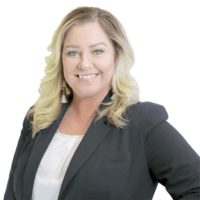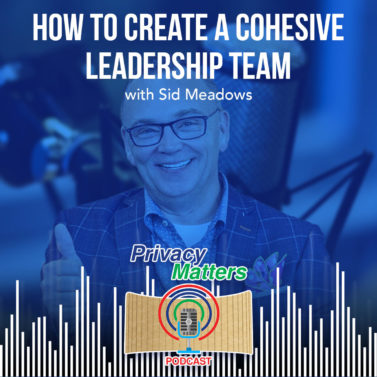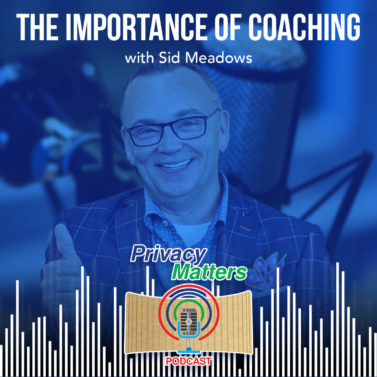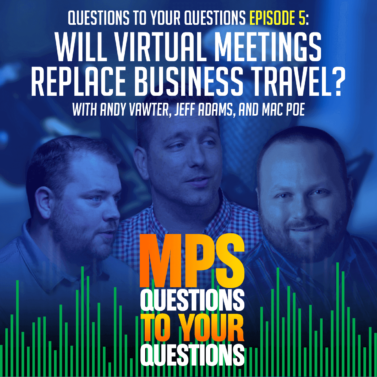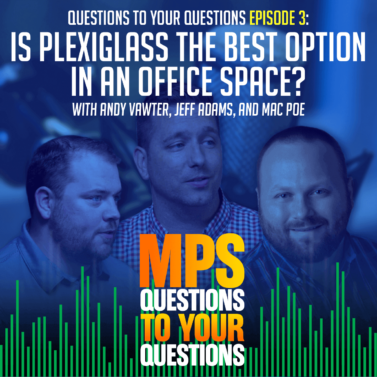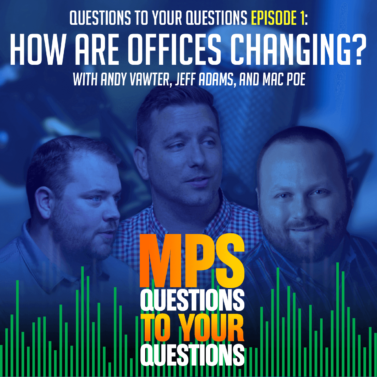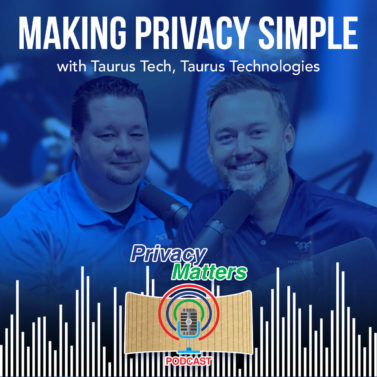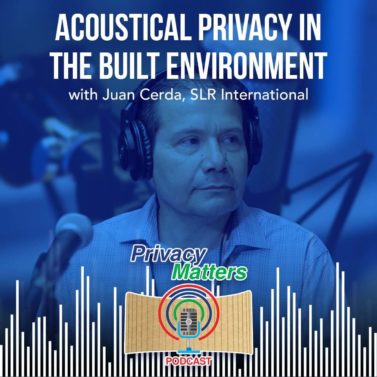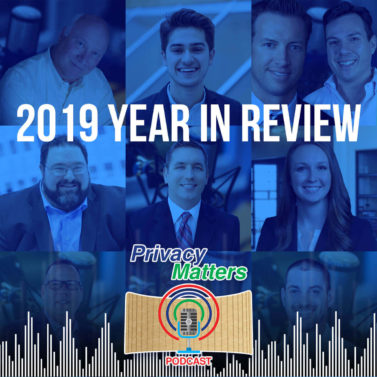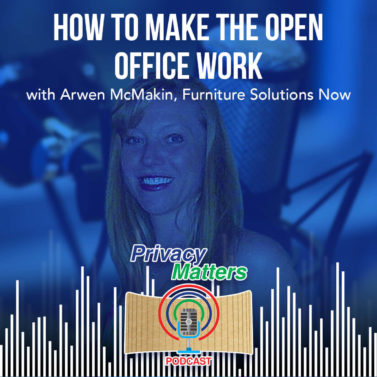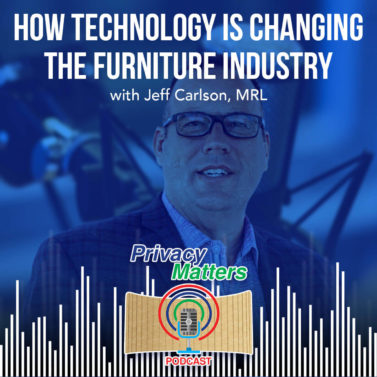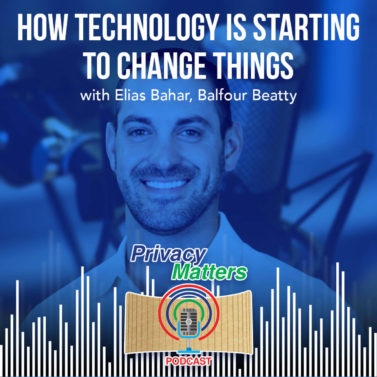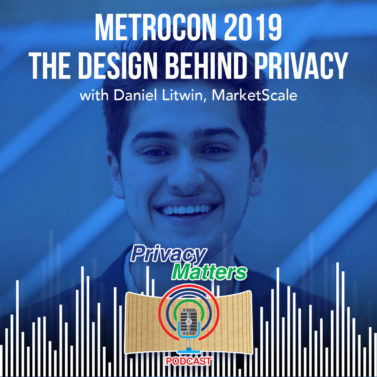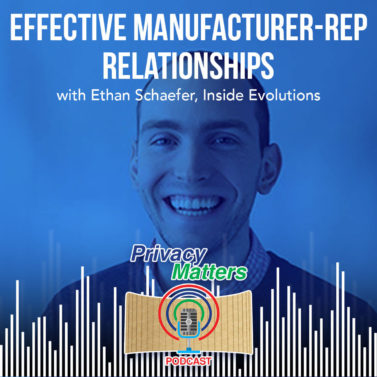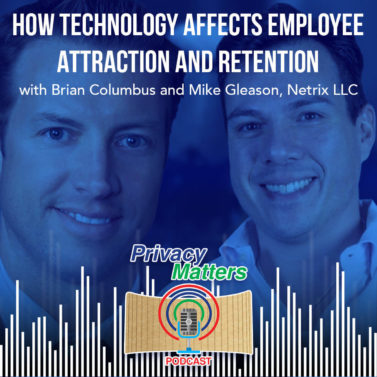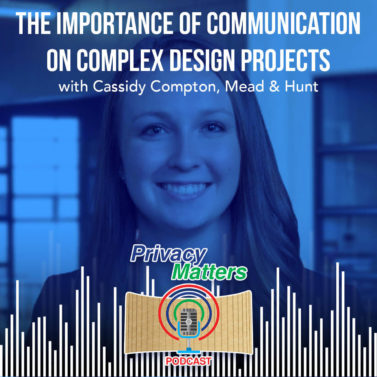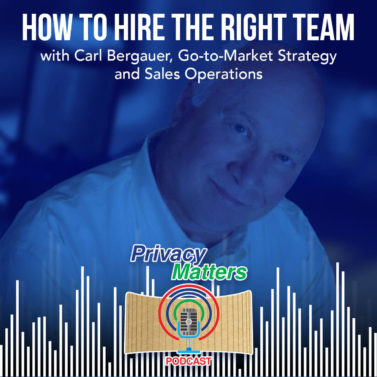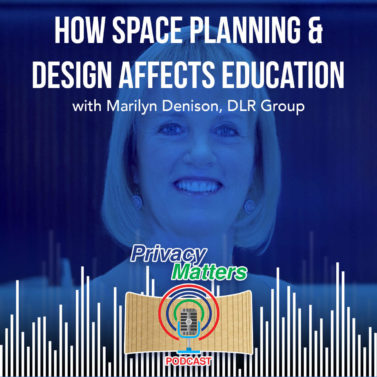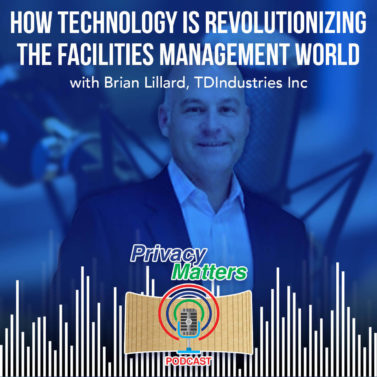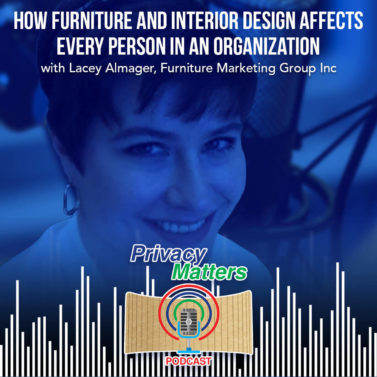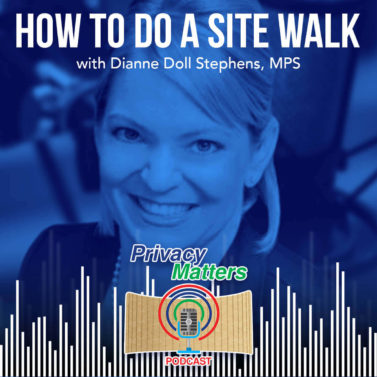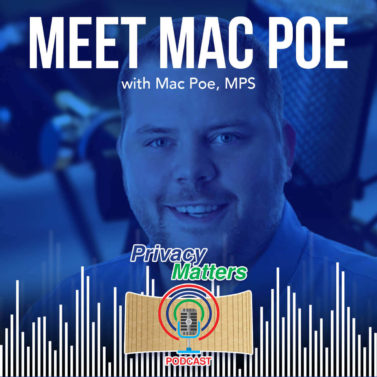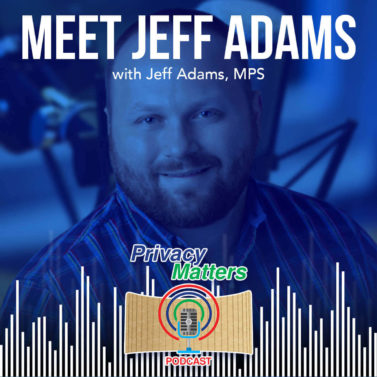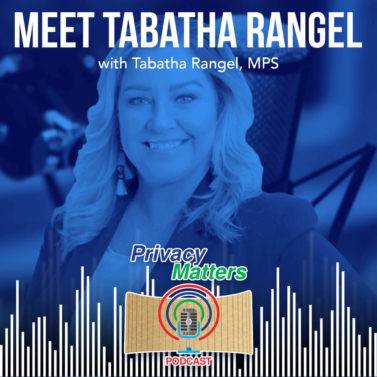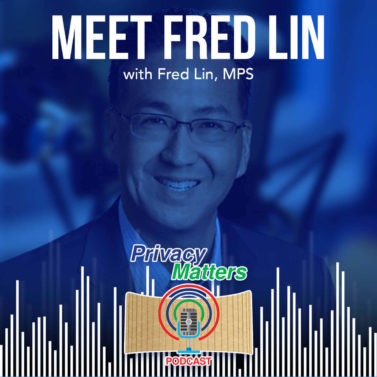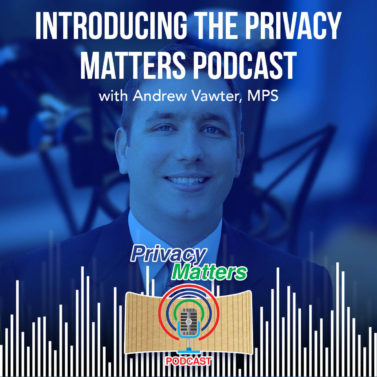Andy: [00:06]
Welcome to Privacy Matters, episode three. I’m your host, Andy Vawter.
Andy: [00:10]
Today, we have our newest salesperson with me, Tabatha Rangel. She comes to us from Sherman, Texas, which is about an hour north of our Richardson Office. And I want to introduce her to everyone today so you can get to know her of course, but then also she can you know, just help deliver some of the things that she’s learning in her early days here at Speech Privacy and hopefully deliver some secrets or some keys to the things that she’s learning and how she’s learning them that we can transfer to new dealers and new reps. Just get some best practices out there. So Tabatha, thank you for being with us today.
Tabatha: [00:49]
Thank you for having me. Good morning, good afternoon, good evening. Whatever time zone you’re in. I’m glad to be here.
Andy: [00:56]
Tell us a little bit about your background, where you came from and how you ended up here?
Tabatha: [01:00]
So I come from a manufacturing background. I have over 20 years of business development, sales and customer service experience under my belt. And my last position, I was in business development and traveled the country for a case, a custom case manufacturer. So I did a lot of traveling in my last position.
Andy: [01:20]
So then you came on here about a month ago and you’re not gonna do a whole lot of traveling here. We, the position you came in at us is mostly phone-based with a few exceptions, maybe some shows and things like that, or big deals or something but we’ve got you here. (Tabatha: So thankful for that.) Is that exciting? Yes. Okay. So you’re excited about the fact that you don’t have to be on an airplane? I never really, yeah. Excellent. So what was it about Speech Privacy or the opportunity that you decided to drive an hour to work every day? What was it about us?
Tabatha: [01:55]
Well, as soon as I met the office staff and management here, I quickly realized that I absolutely loved the culture, the office environment, the people, and the fact that we’re selling such a cool product that basically just sells itself.
Andy: [02:10]
That’s awesome. I love to hear that. I wish it sold itself more often, but you know, that’s why we hire salespeople, right? But you know, that’s really good feedback. We were really excited to have you onboard and I think it was a good click as soon as we met you. But that’s also exciting to know that was one of the reasons that drew you to us. We work very hard here at Speech Privacy to make sure culture and accountability and kind of the way we go about doing our business is something that other people would want to be a part of. So I’m really glad to hear that. Thank you.
Andy: [02:43]
So how would you describe yourself as an individual?
Tabatha: [02:47]
I’m very driven, very ambitious and proud of myself for being successful and helping others become successful.
Andy: [02:55]
Okay. So and we know this about you after just knowing you for a couple of weeks now. Your sense of urgency and want to get things done is at a very high level which is I think is fantastic for what we do as a company.
Andy: [03:10]
So what if there was one thing you wanted to tell, you know, the reps and dealers that you’re getting to know? I mean, you’ve talked to some of them, others you haven’t talked to yet, but what would be the one thing that you want to kinda let them all know about you since you have a microphone in front of your face at this moment?
Tabatha: [03:28]
Well, because I’m so driven and ambitious, my goals are just to be successful and your success depends on my success. So I’m always going to be available for questions and education and helping to do what we can do to become successful together.
Andy: [03:46]
Perfect. So you know that, yeah, I mean, everything we’ve trained you is one of the things that sets Speech Privacy apart is how responsive we are and how on top of it we are. And so, you know, you’ve already latched onto the fact that’s going to help you be successful. And you know, I think that’s a really great point and a lot of our dealers and reps are going to flourish when they have somebody that they can rely on to really help them be successful. So that’s pretty exciting. We’ll talk more personally about you at the end.
Andy: [04:19]
But let’s hit a few things that I think are going to be really helpful for our partners. One of the questions we keep getting asked is you know, especially with new people is how do you get a quote? Like what do we need to get a quote and what do we give back in return? And so you know, I’ve done this for quite a few years now and I can do a design or a quote or give you a budgetary number if you wrote something down on a napkin. And that’s not preferred, that’s also not recommended. We certainly don’t teach our new employees to do it that way. So I thought this was a great opportunity for you to share with everybody out there. What’s the rule book say? Right? Cause we actually have a playbook with the official. What do we mean? And since you’re new, that’s what you’re following. So let’s share that with everybody. What are a few of the things that you need to know about a project or opportunity in order to put together the right solution?
Tabatha: [05:15]
So I would say first and foremost, we really need to know what the client’s issues are. Whether they’re looking for acoustical solutions or design aesthetic solutions. And then aside from that, we need to know some basic factors. So the ceiling, tap, the hat to the ceiling, a floor plan or layout of the area so that we can make some suggestions from there.
Andy: [05:41]
And then, yeah, so just to recap all those things. So everybody understands we need a floor plan and we need to know what’s going on at the ceiling. What’s the height of the ceiling? What’s the type of it? Is it a tile? Is it drywalls? Is there no ceiling at all? And then, you know, the last thing that I find it helpful and I’m sure you have in just your few weeks here already is when people can snap some pictures of space that really helped. (Tabatha: Very helpful for us to see firsthand.) Yeah. So I mean it’s not always possible, but in today’s day and age, it should be relatively easy unless the building just isn’t there yet which in that case there’s a bunch of drawings about what it will be and those typically give us the info. So once we have that is typically going to be enough for us to put together sound masking, design, and quote. And if you know what acoustical products they want, if you have very specific, you know, we want hanging panels in this area and this color and this design, that’s all the information we need and we can get a quote back to somebody.
Andy: [06:44]
Now what do they get when we say a quote, what does that look like from us? Now, obviously it’s going to be a bill of material with pricing and that’s going to be their dealer pricing on it. What else do they get?
Tabatha: [06:57]
Right. So we’re going to provide a layout with a floor plan and the spaces designated for the speakers for sound masking along with the quote that’s atomized including installation and cable if needed. And also a sell sheet so you can see as a dealer what your suggested pricing or your margin would be for a sale.
Andy: [07:27]
Perfect. And we do that because a lot of our dealers are rushing around. They’ve got all sorts of things they’re working on. If they have a really easy attachment with the quote that says, Hey, sell it for this. It just seems to make their life easier. Some of our dealers don’t care about it and that’s actually, that’s great, one less thing for us to do. But that typically happens when they’ve done enough with us that they already know what it is. They already know what the markup is. But we try and make that a standard option that way because we have a lot of new people we’re working with. If we can get them that information that’s preferred. Yeah, so I mean those are really what we need to get a basic quote now where it really gets scary is when someone needs acoustic panels in their space, let’s say they have a noise problem, an echo problem, a conference room is having an issue with noise, but they don’t know what they want. So they’re asking you, Tabatha, hey, I don’t know. Can you make some suggestions and that’s probably if I had to guess, I’m not going to speak for you but as a new employee, that’s probably been your biggest hurdle is when people ask you for specific things you just go to the book and you find it. When they ask for your recommendation, it’s a little more challenging. And so just to share with everybody what we’re doing as a company to help steer people into the right solution. There’s basically one question and I love it. You came up with it. Actually, we were talking as a sales team about questions we’re asking and Tabatha asked this question. We all thought it was fantastic but when they need acoustical treatments like acoustic panels. A simple question of are you looking for more of an aesthetic design-driven solution or is it 100% acoustics driven?
Andy: [09:15]
Is it all about getting the best acoustical solution or do you care much more about how it looks? And so when you ask that question, now we can start designing a solution around what is most important to the customer. Okay, so just to let all of our partners know that out there are different ways we can treat our space. Sometimes it’s more catching to the eye, but it may not be the best. It might be the second-best option for acoustics. Or we can go with the best acoustical option which might also be eye-catching but might not be and it just kind of depends. And so the more we know about what is the driving factor for the customer, then we’re going to start to make recommendations. So a lot of that’s going to be budgetary, right? So I mean, you don’t have to give somebody a quote if they’re just saying, give me some options or ideas, you’re going to give them options and ideas and a budget range so they can understand.
Andy: [10:09]
And that’s really where I’m going with that. And so once a customer likes something they see that’s when you’ll be able to get them a quote. Correct. Absolutely. Perfect. So one question I think would be helpful if you could kind of break this down for everybody and I’ll help you again, cause you’re new. But we’re constantly trying to help people understand what solutions are right for what space. Your very first day here we laid out ABC, absorb, block and cover. I was writing an article on Linkedin about it. And so I had it all written up on my whiteboard. What your actual first question to me was, how in the world do I know what to do? So we walked in, we looked at the whiteboard and a few minutes later you pick clicked. You had a basic understanding of that perspective.
Andy: [10:59]
How do you determine, in your own words, how do you determine what is kind of the best solution for what problem?
Tabatha: [11:08]
Really you need to ask questions. So you need to find out if it’s an acoustical solution driven by distraction and privacy or if it’s an echo and noise bold up, issue that you’re looking to resolve. Sure. So it really depends on the questioning strategy. You have to work together to find out what the issues are to come up with what’s a better resolution or if they’re both combined a better resolution which we’ve seen very successful just in the short time that I’ve been here.
Andy: [11:40]
Perfect. Yeah, I mean, if it’s privacy issues, that’s the age-old sound masking and we’ve done that forever or the company name is Speech Privacy. So when it’s acoustic privacy, sound masking is typically going to be it. When you have built above noise and echo, that’s where an acoustic panel of some sort is going to absorb sound. And then the visual privacy aspect as well where you have divisions in space, desk dividers, things like that are also acoustical but they create that visual privacy needed. And so yeah, that’s a lot of questions that I know our reps, they’ll walk on a site and a customer has problems and they don’t necessarily know and it’s okay that they don’t know. This can be complicated. We just want to constantly try and simplify it for everybody and just kinda break it down to a couple of basic things to remember.
Andy: [12:25]
Do you have any tips that you’ve picked up in the first couple of weeks of how you’ve learned this stuff that you want to share with a rep? Maybe it’s a new rep or a new dealer out there that’s just getting going with us and you know, they could probably benefit from maybe a tip or trick that you’ve picked up here so far.
Tabatha: [12:43]
Yeah, absolutely. So the first thing I would do is ask for a demo kit, ask for samples. So once you have it in your hand and you hear the difference and see the difference, then you’re going to be much more confident at selling it or allowing it to sell itself. That’s what sold me on it is experiencing the product.
Andy: [13:03]
Well said. Yes. So we typically hire people sometimes in the interview we do demos for them so they understand what we do. Most of the time we don’t because when you’re hiring someone for sales, you don’t really care at that moment if they know a whole lot about the solution, it’s much more are they a culture fit. Do they have the skill set, you know, do they fit all the other things, the intangibles. We can teach product knowledge and all that. So, but that’s not typically what we do in an interview so we didn’t do that with you. You just checked out our website, we interviewed you. And then when you came in on your first day, you still didn’t really understand what it was that we did. So the first thing we did was walk you through space and then demo the sound masking, turn the system off and all of a sudden it clicked. You can feel the experience and understand really what the solution is doing. So I’m really glad you said that because that actually brings us to the next thing I wanted to talk about.
Andy: [13:54]
So we covered kind of the basics of quoting. Now let’s talk about demos and samples because you just said it perfectly. Being able to demo something and understand it and experience it really made it make sense for you and you’re encouraging our dealers and reps to do the same thing. If they get a demo and do a demo and have one, they’re going to understand it better, which means they’re going to be able to sell it better. And then they’ll be able to demo it for their customers so they understand it. So let’s talk about that for a little bit. We have demo kits available. All of our reps out there have a demo kit. It actually is provided, I get the case that it’s in? Is the case company that you worked for? Ironically enough. But so we have a program where dealers can purchase that for $500. And once they get in their hands and you read it, really recommend that now they can experience it themselves and believe and then share with others and help them understand and believe. We also have a program where they can get reimbursed for that $500. If you remember, what’s the number that if they sell enough, I’m putting you on the spot here. See if she remembers. (Tabatha: It’s 25,000.) It is 25,000. (Tabatha: Okay. I win.) So yeah, so a dealer can purchase a demo kit for $500 and once they hit $25,000 in sales we will reimburse that $500 on the invoice. So, we want to make it as low a bar to get that demo kit in their dealership and to get those people using it as possible. And so that’s what we’ve come up with.
Andy: [15:32]
Another sample that we have is our sample ball. So we originally sent out just little squares of our product as the sample ring or chainset, if you will. It actually had a chain and we are about to launch our new sample balls. So it’s essentially the pieces are all cut almost in an origami-style where they all fit together and create a sphere with all the colors. So those are gonna be ready in the next week or two. So you should be able to start to request those from Tabatha or Jeff for Mac or anybody else in our office very soon. But we want to get those out and in people’s hands as often as possible because not only does it show the options available, but it kind of shows a little bit of the capabilities which we really want to be demonstrating as often as possible.
Andy: [16:22]
We also have showroom discounts for sound masking. Those are going to be custom quoted. So we can do those quote by quote for dealers because there’s labor involved and a couple of other things that go into it. But as far as the acoustical Ecoprivacy, we want to get that in dealer showrooms as well. So what’s the program numbers for that? I’m sure you can remember. (Tabatha: Sending over the acoustic panels, we have a really great discount for our dealers and I believe it’s 50 50.) Right. So an additional 50% off for their showrooms. So we really, again, this is designed to make sure that we can get as much of this into your space as possible. You can pick standard stuff from our catalog and just say that’s what I want or we can do custom things. I actually posted an image of a dealer in Austin who came up with a custom skyline of Austin. It was pretty awesome looking. (Tabatha: It was very cool.) Yeah. And they were impressed. We were impressed. Everybody thought it was neat. That was a pretty, pretty neat thing to have somebody create that as far as the design for us and then we produced it. And so that’s open as well, dealers can get creative, whatever you want in our space, then we can make it affordable and get it there as easy as possible. So I’m going to cover this mostly how to demo a sound masking system. Tabatha and I have talked about this. She’s trained on it and we actually did it for her when she came in. She didn’t even realize we were demoing it this way, but I want to explain this to everybody. We train our reps this way but also get this information out to our dealers.
Andy: [17:51]
And it’s important because if done wrong and I’ve seen it done wrong, it can really misrepresent the solution and actually lose a sale. And so let’s start with what not to do and this is what everybody loves to do with samples. So I’ll contrast that. If you have our acoustic panel ball, you want to set that on the table and have everybody look at it, play with it, pass it around, touch and feel it. That’s how you demo acoustic panels cause it’s cool. Yeah. But sound masking, we have to treat a little bit differently. With sound masking, you don’t want to just set the kid on the table and turn it on and let everybody on and of the white noise coming out in the case. I think that will be very ineffective. In fact, it gets people to be like, okay, stand over there and say something. No, I can still hear him. This doesn’t work. I mean, I’ve literally heard that happen on a demo so that’s not the way to do it. The appropriate way is to get in early, whether you have a showroom or you have your kit, turn the system on and get it going and then ignore it. Do something else. You know, talk about the weather, sports, you know, your family, whatever you want to talk about the chair that you brought a sample of as well. Whatever you want to talk about, change the subject. And then after a few minutes and everybody’s kind of ignored that the system is on, that’s when you can go and flip the switch, turn it off. So instead of demo in it from off to on, you demo it from on to off. And that contrast of it was working and we didn’t really hear anything too. Bam. Now I can hear everybody and now I can hear down the hall and hear what they’re saying is that is an extremely effective demo both in a showroom like if you come into our space or if you take that kit to somebody else’s space. And so we’re constantly trying to communicate that to folks so they can hear it and understand it. Anything you want to add to that base because you just experienced this recently when we brought you in.
Tabatha: [19:45]
Yes. Well, that was definitely just almost mind-blowing for me because I was unaware that the system was on when we were speaking and we were speaking about lots of different things. And then all of a sudden you turn it off and the entire room changed. Everybody’s tone. Everybody’s voice. The noise level as it was just a huge difference. So that’s what I mean when I was referred to the product, just basically selling itself. So if you like Andy said, you just have it on unknowingly and then turn it off then you can really see the difference.
Andy: [20:19]
Great. Yes. It sells itself but we need people to demo it so that’s the message, right? Well, so we’ve talked about the quote process. We need a floor plan with some basic information about the ceiling and areas to cover. And images are just fantastic cause that gives us so much more information about how to correctly design these solutions. Then in return, you’re gonna get a design. You’re going to get a bill of material with a quote and you’re going to get a sale price with suggested markup and margin and everything. And then we talked about the demo kit and how for $500 you can have it. The kits shipped to you and then reimbursed if you sell 25,000 as well as our showroom discount of 50, 50 and I’m just really how to demo it.
Andy: [21:07]
So let’s finish with a little bit just about you as a person. Tell us a little bit more about what’s your like away from Speech Privacy and we’re going to start with what is your favorite thing to do or what are your favorite things to do when you’re not at Speech Privacy?
Tabatha: [21:24]
Well, right now I am a single mom and my daughter is about to be 18 and I’m about to be an empty nester. So I enjoy spending my time with her right now before she leaves me. And I love to decorate, reorganize and clean my house which is awkward for everyone but me. (Andy: Do you enjoy cleaning your house?) I do. (Andy: Well, once your daughter is out of the house, it might not get as dirty as often, I’m guessing.) Right, exactly. (Andy: And she’s going to be not going too far. She’s going to Texas Christian University.) Thankfully. Yes. She’s just going to be in Fort Worth. So it’s pretty close. (Andy: So she’s far enough away to not be home but she’s close enough to be home whenever she needs to be. Right.) Yes.
Andy: [22:10]
That’s pretty awesome. If you had all the money in the world, what would you do?
Tabatha: [22:15]
Well, that’s a tough one. So I love to travel. I think I need a little or maybe a lot of vacation time. Maybe travel the world and take some sound masking with me and introduce it to some other areas of the world. (Andy: You can try and make a boat out of acoustic material and you can sail around the world.) Absolutely. Panels and all. (Andy: Yes. Office out of Fiji. We’ll see.) Very aesthetic.
Andy: [22:41]
So yeah, you love to travel. That’s fantastic. And we’ll probably talk more about this at some point but an interesting point about Speech Privacy. You might not know this about us but we don’t have vacation days so that if Tabatha had all the money in the world she wanted, she could not take any vacation days. I’m joking. We don’t have vacation days because we just let our employees take off when they need it for whatever they need and no one’s keeping count. And so it’s just an interesting little thing I mentioned at the beginning, kind of we really try and focus on the culture and how we treat our employees. So the way we look at it, we treat them with the utmost respect. They can, you know, they control their own job. They may need to make sure they do a good job and part of that is, hey, if you need a day off or you need a week off, you need to fly to Fiji or boat to Fiji, I don’t know. You can, you know, make sure your job is done, make sure your job is covered. But that’s kind of trust that we put in our employees. So just one of the many things that we try and do around here to make sure our people are fully invested in working for themselves and also working for us.
Andy: [23:45]
So well Tabatha, thank you so much for being in this episode. Please listen to this podcast, listen to the other ones if you haven’t subscribed to it. We’re going to continue putting these out, get to know the rest of the team and hitting relevant topics that our partners would hopefully find some value in hearing from us. And then if you have any suggestions at all, if there’s something you didn’t understand or something you want to learn more about or something we haven’t talked about yet, let us know. You’ve got you to know, all of our email addresses. You can call her my number, you can, you know, Linkedin and you could send a carrier pigeon whatever you want to do to get information to us. But we’d be happy to continually hone these episodes in to make sure that they’re applicable and worthwhile to our partners. So thanks again and we’ll see you next time.

